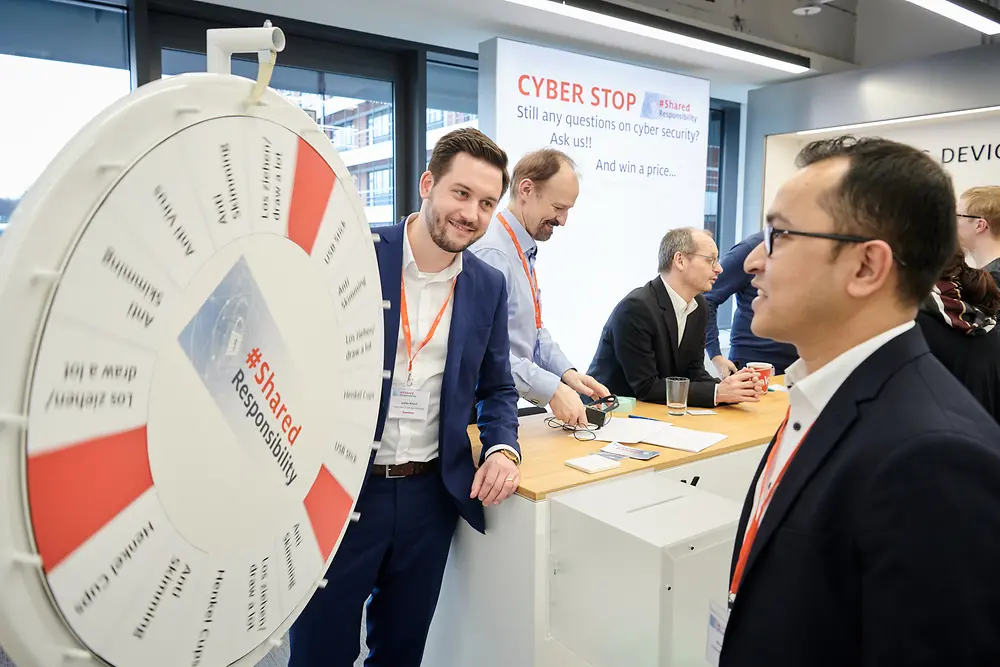Learn more about Henkel Brands & Businesses in UK & Irelands: Includes useful information about the brands, technologies and latest innovations in our business areas: Henkel Adhesive Technologies and Henkel Consumer Brands.
How companies can protect themselves from cyberattacks
Not so long ago, supercomputers, hackers and cyberattacks were a scenario of Hollywood movies rather than of business reality. Not anymore: Operating in an increasingly digitized environment, companies and individuals are being targeted by cyber criminals and need to stay alert to protect themselves.
Online shopping, mobile payment and other internet-based services can make our lives much easier: We communicate via e-mails, post pictures on social media and order goods online. But what we perceive as both a great relief and an opportunity for our professional and private life also carries a high risk. After gaining access to private information, the hacker can ransom the information, use it against competitors, or even sell it on the Dark Web. Sometimes hackers attack the integrity of a company and leak information to the public and influence them.
But how do they get access? According to a study completed by the technology security company Kaspersky, from 2016, most of the people who had their information stolen had received and interacted with fake e-mails, fake social media messages and fake websites. Phishing e-mails are the single most common entry point of cyberattacks. Phishing is a fraudulent attempt to obtain sensitive personal or business-related data or to infect computers. Typically carried out by e-mail, anonymous cyber criminals aim to control devices, use them for illegal purposes or utilize a fake identity, for example to request an emergency bank transfer. The Kaspersky study also stated that the most commonly attacked accounts are e-mail and social media, which are twice as likely to be hacked as shopping or online bank accounts. Because all important personal information is linked to either e-mail or social media, that can spell out trouble for those who don’t practice cyber security.

Cyber security has become increasingly more important, also because more and more processes and areas are digitized. We must be aware that there is no such thing as 100 percent safety. However, Henkel is very well positioned – we have invested heavily in our expert teams, technology and awareness to protect our company.
Uwe Wirtz, Head of IBS Governance & Security at Henkel
What is Henkel doing to promote cyber security?
One of the most important ways for corporations to protect themselves is through educating their employees. In their cyber awareness campaign #SharedResponsibility, which placed second at the Cyber Security Leader Awards 2019, Henkel’s IT Security team focuses on three strategic areas: inform, educate, engage. The company, for example, informs its employees through regularly published news on the intranet portal and the company-wide security policy is accessible for the entire staff. Henkel has also introduced mandatory trainings for management employees around the world, so that they implement appropriate measures in their departments and locations.
To further engage employees in this important topic, Henkel hosted its first Cyber Awareness Fair: This week-long event was organized by the IT department in collaboration with colleagues from Corporate Compliance, Corporate Security and Corporate Audit. 59 internal and external experts, including a member of the German federal cyber police, presented a total of 37 topics, among them social engineering, security in Industry 4.0, the security of mobile devices, and how to prevent e-mail fraud. Hosted in Duesseldorf and broadcasted to 81 countries, the fair was visited by more than 7000 employees worldwide. Some of these trainings and event formats had a more playful and engaging nature to them, for the sake of getting employees interested in learning about tech safety. All so employees develop a sense for their own IT protection, take problems seriously and know when to involve professional IT security.
5 days and 7 market stands: At the Cyber Awareness Fair under the motto #SharedResponsibility, Henkel employees could learn how to prevent a cyber security incident, interact with IT security experts and win prizes.
INDUSTRY 4.0
HOW DIGITALIZATION TRANSFORMS PRODUCTION AND LOGISTICS
It’s efficient, digital, sustainable, connected, and smart. But what exactly is Industry 4.0? It’s the buzzword surrounding the fourth – and completely digital – revolution. After the steam engine and the assembly line, the computer brought about the third industrial revolution. Now, digitalization is transforming the industrial process once more. By taking advantage of this rise in automation, sensorics, data exchange and analytics in real time, companies are producing and delivering products smarter, faster and more efficiently, thereby opening a new world of possibilities.
SPOTLIGHT
MAGAZINE
MAGAZINE
Discover our features with stories and expert insights on innovation, sustainability, digitalization and Henkel’s pioneering culture.








